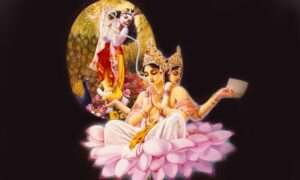False renunciation is prohibited. In Bhakti-rasamrta-sindhu it is written:
prapancikataya buddhya
hari-sambandhi-vastunah
mumuksubhih parityago
vairagyam phalgu kathyate
When someone is anxious to achieve liberation and renounces things related to the Supreme Personality of God as material, that renouncement is called phalgu, or incomplete.
Those who have qualified to chant the holy name forsake all fruitive activities. In Srimad Bhagavatam (11.5.41) it is written:
devarsi-bhutapta-nrnam pitrinam
na kinkaro nayam rni ca rajan
sarvatmana yah saranam saranyam
gato mukundam parihrtya kartam
Whoever has renounced his material duties and has taken full refuge at the lotus feet of Mukunda, the refuge of all, is not in debt with the demigods, with the great sages, with ordinary living beings, with relatives, with the friends, with humanity, or even with one’s ancestors.
According to the Padma Purana, one must abandon the niyamagrahah and follow the essence of the niyama.
smartavyah satatam visnur
vismartavyo na jatucit
sarve vidhi-nisedhah syur
etayor eva kinkarah
Visnu, who is Krishna, should always be remembered, at all times, and never forgotten. All the rules and prohibitions mentioned in the sastras should serve these principles.
One should refrain from purification related to karma and jnana. The Padma Purana makes the following statements:
harer apy aparadhan yah kuryad dvi-pada-pam salah
namasrayah kadacit syat taraty eva sa namatah
namno ‘pi sarva-suhrdo hy aparadhat pataty adhah
namaparadha-yuktanam namany eva haranty-agham
avisranta prayuktani tany evarthakarani ca
The lower human beings who commit offenses at Sri Hari’s lotus feet will certainly be able to cross the material ocean if they somehow take refuge in the holy name. On the contrary, those who commit offenses against the holy name, which is the benefactor of all, will surely fall. They can get rid of their offenses only by continuing to chant the holy name. In fact, it is possible to achieve all kinds of perfection with continuous chanting.
One should try to acquire knowledge of both, of Krishna and of ourselves. First acquire knowledge of Krishna’s form, attributes and then pastimes, as stated in the Catuh-sloki Bhagavatam, beginning with (2.9.33):
aham evasam evagre
nanyad yat sad-asat param
pascad aham yad etac ca
yo ‘vasisyeta so’ smy aham
Brahma, I am the Personality of God that existed before creation, when nothing but Me existed. Not even material nature was the cause of this creation. Who you see now is Me, the Personality of God, and after the annihilation I will remain alone, the Personality of God.
Sri Krishna, the personification of absolute truth, is eternal and ever existing. All other manifestations, spiritual and material, are the result of His varied energies. Sri Krishna, who is like a transcendental sun, remains as eternal truth after universal destruction. This is the basis of the philosophy of acintya bhedabheda tattva.
Knowledge regarding the form of maya-sakti and jiva-sakti is found in Srimad Bhagavatam (2.9.34):
rte ‘rtham yat pratiyeta
na pratiyeta catmani
tad vidyad atmano mayam
yathabhaso yatha tamah
O Brahma, anything that seems to have value, if it is not related to Me it is not real. Know that it is my illusory energy, that reflection that appears in the darkness.
This is a section of the book “Bhajana Rahasya”, by Bhaktivinode Thakura.
To buy the complete book, click above
Post view 151 times



